May 14, 2025 | 09:51 GMT +7
May 14, 2025 | 09:51 GMT +7
Hotline: 0913.378.918
May 14, 2025 | 09:51 GMT +7
Hotline: 0913.378.918
On the morning of December 13, the Workshop on Promoting Responsible Investment, Green Investment for Green Growth in the Agriculture - Potential for Investment Cooperation with Japanese Technology and Smart Agriculture Enterprises, took place.
The event aimed to strengthen investment cooperation between Vietnam and Japan, with a focus on developing smart, high-tech agriculture, aiming for green growth and sustainable development for Vietnam's agricultural sector. It also served as an opportunity for businesses from both countries to share experiences, introduce advanced technologies, and open up new opportunities for cooperation in a modern, responsible, and sustainable direction.
In his opening speech, Mr. To Viet Chau, Deputy Director of the Department of International Cooperation, stated: "Now more than ever, Vietnam needs to quickly attract investors with strong technological and financial potential, especially in the fields of modern, high-tech, and sustainable agriculture."
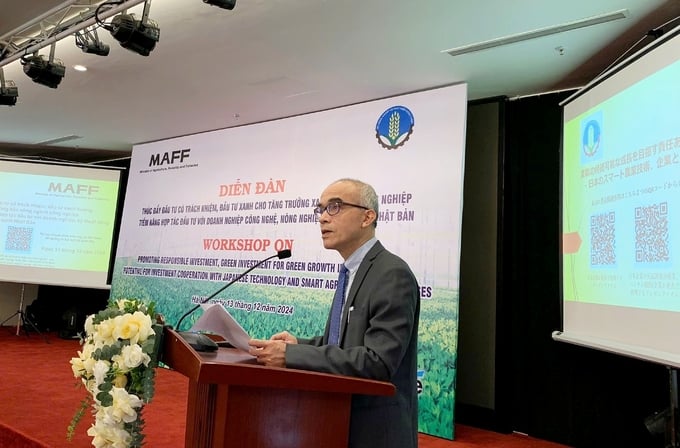
Mr. To Viet Chau, Deputy Director of the International Cooperation Department, gave a speech at the Workshop on Promoting Responsible Investment, Green Investment for Green Growth in the Agriculture. Photo: Kieu Chi.
According to the Deputy Director of the International Cooperation Department (Ministry of Agriculture and Rural Development), Japan has long been an important strategic partner of Vietnam in many fields, particularly in agriculture. Japan has strengths in advanced technology and management experience. Japanese businesses have always been at the forefront of applying high technology and promoting the development of smart agriculture, which is exactly what Vietnam needs to achieve sustainable growth and development goals.
The cooperative relationship between Vietnam and Japan in the agricultural sector not only helps improve production efficiency but also creates a solid foundation for long-term development, aiming for a bright future for both countries.
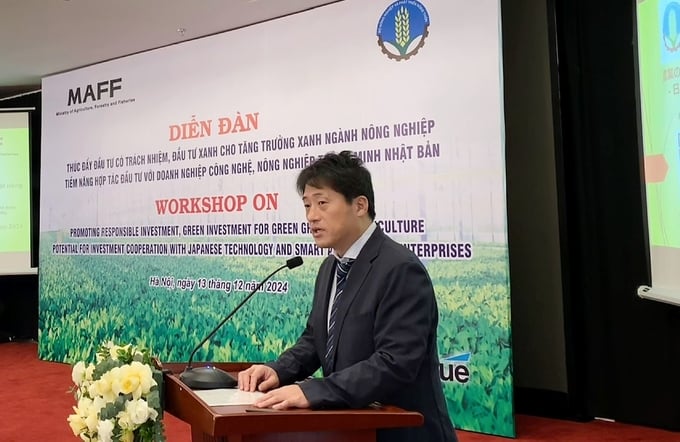
Mr. Sato Fumiaki, Deputy Director of the Export and International Relations Bureau (Ministry of Agriculture, Forestry, and Fisheries of Japan), shared at the workshop. Photo: Kieu Chi.
Mr. Sato Fumiaki, Deputy Director of the Export and International Relations Bureau, emphasized the many similarities between Vietnam and Japan, noting that both countries share a similar climate and rich nature, especially in agriculture and food production, with rice being a major staple crop.
Vietnam, with its abundant natural resources, is an attractive destination for investors. Japan is committed to sharing knowledge and technology with Vietnam to promote smart, sustainable agriculture. The green cooperation commitment and carbon emission reduction between Japan and ASEAN will serve as a foundation for deeper collaboration between the two countries, contributing to the development of a modern and low-emission agricultural sector.
According to Ms. Nguyen Thuy Linh, an official of International Cooperation Department (MARD), another important factor in the cooperation between Vietnam and Japan is the preferential policies and three free trade agreements (CPTPP, VJFTA, ASEAN-JFTA) that the two countries have signed. Vietnam currently has a highly open economy, with many incentive mechanisms for foreign investors, especially in high-tech agriculture. The FTAs create a favorable environment for Japanese businesses to invest in Vietnam, while also supporting Vietnam in enhancing its production and export capacity in the agricultural sector.
"As of 10 months into 2024, the total registered foreign direct investment (FDI) in Vietnam had reached nearly 27 billion USD, and this figure increased to 31 billion USD by the end of November, showing rapid growth. Of this, Japan accounts for about 10% of the total investment," Ms. Nguyen Thuy Linh shared, adding that Vietnam is seeing new bright spots, with a shift in investment structure, abundant labor resources, and increased participation in agricultural and food sectors. Additionally, the mechanism for promoting public-private partnerships (PPP) is opening up vast potential for investment cooperation between Vietnam and Japan.
Japan is not only an important economic partner for Vietnam but also a pioneer in applying advanced technology, digital transformation in production, and artificial intelligence. With its strong experience in management and sustainable development thinking, Japanese businesses also bring significant investment cooperation potential to promote smart and high-tech agriculture in Vietnam.
Current trends in FDI in agriculture include the application of artificial intelligence, automation in cultivation, livestock farming, processing, as well as the development of smart farming with controlled environments and blockchain technology. The supply chain is controlled through digital technology, while biotechnology and genetic modification are being developed to optimize investment effectiveness without negatively impacting human health.
Translated by Kieu Chi
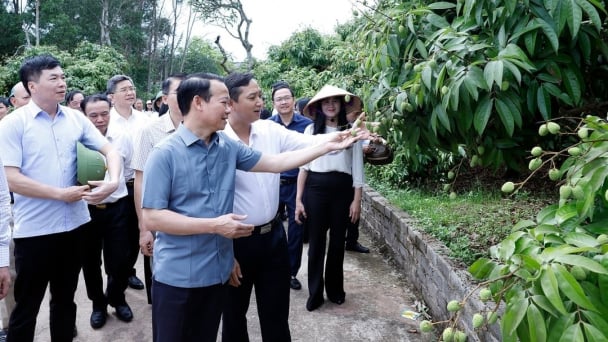
(VAN) Agriculture and environment sector experienced a 3.74% increase in growth during the first four months of 2025, with exports surpassing 21 billion USD. This growth was sustained by effective reforms and a trade surplus.

(VAN) Taiwan offers a promising market for Vietnamese turmeric; however, it enforces stringent standards, particularly concerning residual additives, colourants, and substances with potential carcinogenic effects.

(VAN) Through activities at Vietnam Sea and Island Week 2025, solutions will be developed to fully harness the potential and advantages of Vietnam's marine economy.
![Multi-channel, multi-directional Vietnamese agricultural markets: [4] EVFTA and the 0% tax advantage](https://t.ex-cdn.com/nongnghiepmoitruong.vn/608w/files/linhnhp/2025/05/12/day-chuyen-che-bien-tom-tai-1-nha-may-cua-sao-ta-205536_359-1044193.jpg)
(VAN) The near-complete elimination of import tariffs on Vietnamese goods makes the EVFTA the highest commitment the EU has ever made to a partner in its signed trade agreements.
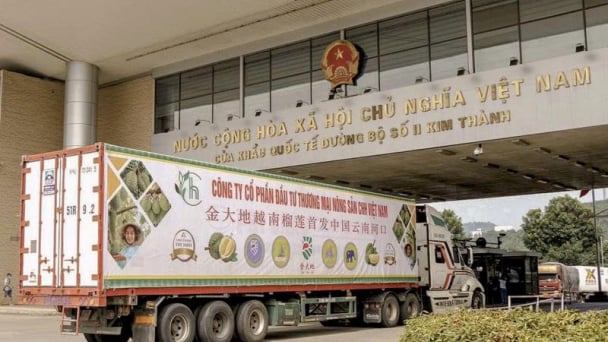
(VAN) Deputy Minister Phung Duc Tien hopes that China will facilitate the entry of Vietnamese agricultural products into its market and accelerate customs clearance at border gates.
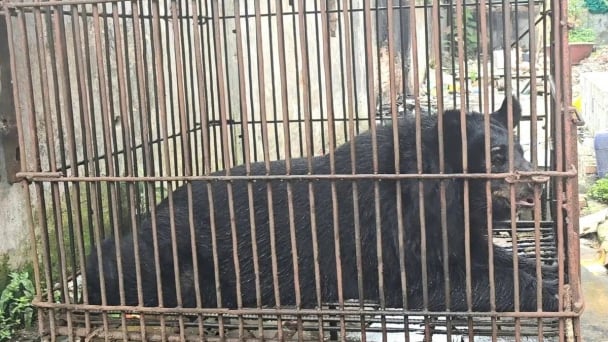
(VAN) On May 10, the Animals Asia Foundation and the Hai Phong Crop Production and Forest Protection Department successfully rescued a nearly 20-year-old sun bear that was being kept by locals.
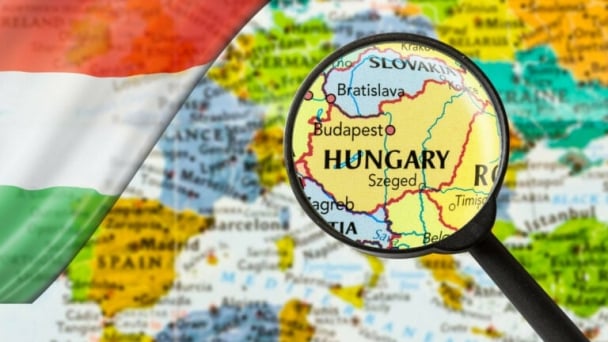
(VAN) Does Hungary have an opportunity to expand poultry production in the coming years despite the pressure from avian influenza and challenges of the trade war?